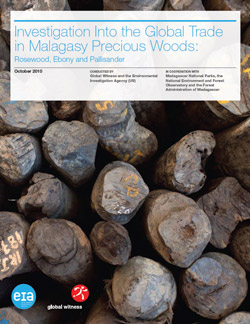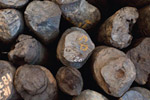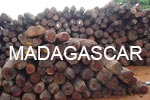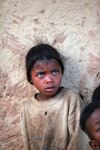Video released by the Environmental Investigation Agency reveals Chinese rosewood traders have direct links to Madagascar’s President Andry Rajoelina, who seized power during a March 2009 military coup.
The undercover investigation found several instances of dealers in China who claim direct dealings with the highest levels of Madagascar’s interim government.
Liu Hongyu, a manager at Beijing-based Meheco, a rosewood wholesaler, was captured on camera saying that she deals directly with Rajoelina.
Mr. Lu, owner of an import company in Guangzhou, told investigators he is a friend of Rajoelina and has imported over 1,000 containers of rosewood from Madagascar.
“Sometimes the government does not have the money to pay its workers, this they sell the wood to get money,” he said on camera. “Each container the government charges over $45,000, then they also charge duties.”
The findings seem to confirm what local sources have been saying for months: the interim government has profited from illegal logging.
The investigation also found rosewood dealers advising customers how to smuggle illegal timber into the United States.
“You can declare customs in English, but you must declare it as ‘wooden furniture'”, said a saleswoman and shop-owner interviewed by the investigators. She noted that rosewood should not be declared on the customs form.
“We have… never had a problem.”
The investigation found that Madagascar rosewood is being turned into expensive furniture, including beds that retail for $650,000-$1,000,000. EIA estimates that 98 percent of rosewood illegally shipped from Madagascar ends up in China.
 Investigation Into the Global Trade in Malagasy Precious Woods: Rosewood, Ebony and Pallisander |
“In China, Malagasy rosewood beds sell for a million dollars apiece, yet less than 0.1% of the profits remain with local people,” said Alexander von Bismarck of EIA, in a statement. “I don’t think the buyers of these beds would sleep well at night if they knew the full story behind their beds.”
The investigation confirmed that dealers are aware that the rosewood they traffic and sell is being sourced illegally, contributing to the destruction of Madagascar’s rainforests.
Trade in rosewood has been banned since March 2010 when the “transition authority” — the group that seized control of the country in March 2009 — established a moratorium on the logging and trade of precious hardwoods in response to international outcry. Nevertheless recent reports indicate logging continues in Masoala and Makira, rainforest areas recognized as a Global World Heritage Site.
Rosewood logging erupted in the aftermath of the 2009 coup. Tens of thousands of hectares were affected, including some of the island’s most biologically diverse national parks: Marojejy, Masoala, and Makira. Illegal logging spurred the rise of a commercial bushmeat trade. Hunters slaughtered rare and gentle lemurs for restaurants. Timber trafficking, which involved armed gangs marauding through national parks, also hurt tourism, a critical source of direct and indirect income for many local communities. Rosewood traders intimidated and, in some cases, attacked those who attempted to stop the plunder.
Related articles
The $1M bed: why Madagascar’s rainforests are being destroyed

(10/26/2010) Consumer demand for rosewood furniture and musical instruments is driving illegal logging in Madagascar’s national parks, endangering wildlife and undermining local community livelihoods, according to a new report from the Environmental Investigation Agency (EIA) and Global Witness. The report, based on more than a year of investigations, shows that Madagascar’s valuable hardwoods—including ebony, pallisander, and rosewood—are being illegally harvested from rainforest parks and trafficked to Asia, Europe, and the United States. The vast majority of timber however ends up in China, where it is converted into luxury furniture.
The illegal logging cycle in Madagascar
(06/23/2010) The latest issue of the journal Madagascar Conservation & Development provides a comprehensive look into Madagascar’s illegal logging trade, which has generated more than $200 million for a small group of individuals over the past year. The trade, which spikes just prior to national elections and may be a source of funds for ruling politicians, has taken a heavy toll on the lowland rainforests of Madagascar, with targeted species now at risk of extinction.
Madagascar bans rainforest timber exports following global outcry

(03/25/2010) Under mounting pressure over illegal logging of its national parks, Madagascar’s transitional government on Wednesday reinstated a ban on rosewood logging and exports. The decree (no. 2010-141), which prohibits all exports of rosewood and precious timber for two to five years, was announced during a council meeting held yesterday at Ambohitsorohitra Palace in Antananarivo, Madagascar’s capital city.
How to end Madagascar’s logging crisis

(02/10/2010) In the aftermath of a military coup last March, Madagascar’s rainforests have been pillaged for precious hardwoods, including rosewood and ebonies. Tens of thousands of hectares have been affected, including some of the island’s most biologically-diverse national parks: Marojejy, Masoala, and Makira. Illegal logging has also spurred the rise of a commercial bushmeat trade. Hunters are now slaughtering rare and gentle lemurs for restaurants.
Satellites being used to track illegal logging, rosewood trafficking in Madagascar

(01/28/2010) Analysts in Europe and the United States are using high resolution satellite imagery to identify and track shipments of timber illegally logged from rainforest parks in Madagascar. The images could be used to help prosecute traders involved in trafficking and put pressure on companies using rosewood from Madagascar.
Coup leaders sell out Madagascar’s forests, people

(01/27/2010) Madagascar is renowned for its biological richness. Located off the eastern coast of southern Africa and slightly larger than California, the island has an eclectic collection of plants and animals, more than 80 percent of which are found nowhere else in the world. But Madagascar’s biological bounty has been under siege for nearly a year in the aftermath of a political crisis which saw its president chased into exile at gunpoint; a collapse in its civil service, including its park management system; and evaporation of donor funds which provide half the government’s annual budget. In the absence of governance, organized gangs ransacked the island’s biological treasures, including precious hardwoods and endangered lemurs from protected rainforests, and frightened away tourists, who provide a critical economic incentive for conservation. Now, as the coup leaders take an increasingly active role in the plunder as a means to finance an upcoming election they hope will legitimize their power grab, the question becomes whether Madagascar’s once highly regarded conservation system can be restored and maintained.